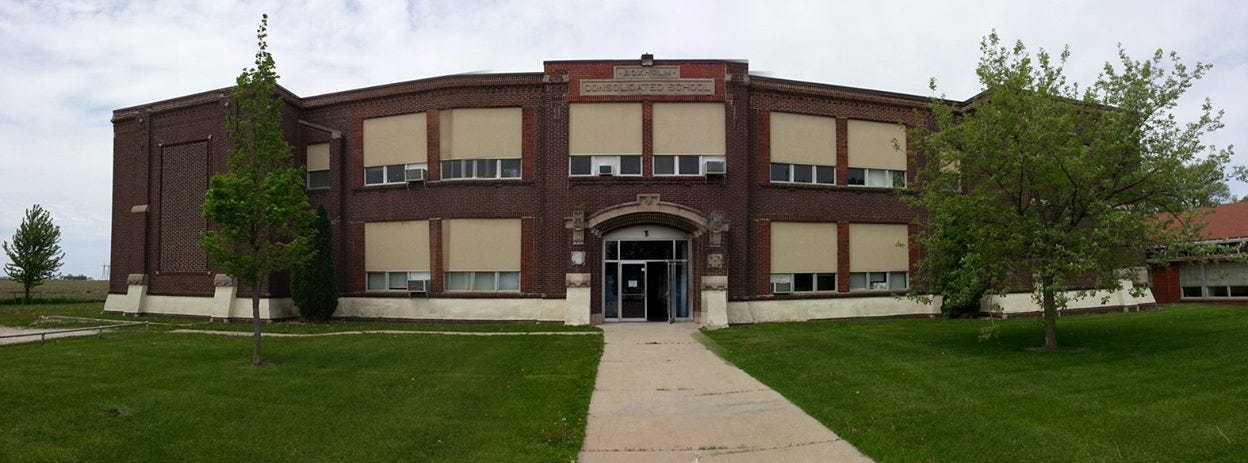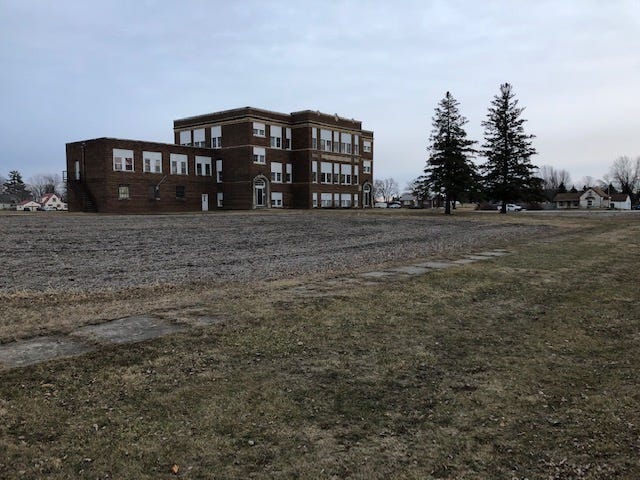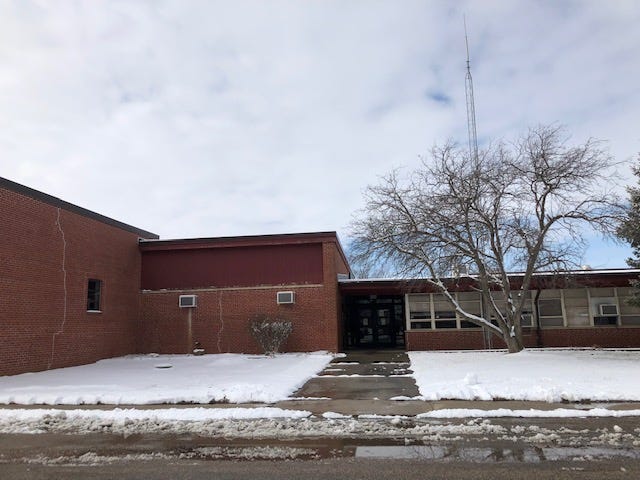In 2014, a new book, for all the small schools, a photographic pursuit of Iowa's forgotten schools, by Barb and Dave Else, featured 220 abandoned Iowa high schools. Our local school, Grand Community in Boxholm, Iowa, pictured on page 29, was one of the most recent closures.
For almost eight years afterwards, this two-story school building that opened its doors in 1917 was the focus of local conversations and rumors regarding its future. Prospective buyers occasionally surfaced, but their plans weren't a good fit for a town of 180 residents. But recently I realized there's one plan that no one ever proposed.
It came to me as I read a "Capitol Round-up" column by local-boy-makes-good, Senator Jesse Green (R-Boone). His bio states that he attended a Christian school in Ft. Dodge, but he graduated from a public high school in my neighboring county. He disappointed many of us in his hometown area of Harcourt in Webster County with his unequivocal support of using public dollars for private school vouchers.
Now Green is adding insult to injury with legislation regarding school properties. Describing SSB 3112 (now HSB679) as "a personal bill of mine," he said he aims to address "some complications that have sprung up this past year in regard to how schools get rid of properties they no longer desire to keep or maintain".
He said he's become aware that "some public schools are refusing to sell their old buildings to existing accredited private schools for no good reason . . . they would rather tear the buildings down than see another school use it".
And here's the kicker. "I do not think this is the best use of taxpayer dollars," he stated. Isn't that rich? Of course it’s not! Don't we all agree that the best use of taxpayer dollars is funding families who don't need our help to pay for private schools for their kids?!
After all, vouchers were pitched as a way to help students unable to afford private school tuition. Last month, Iowa Department of Education's certified enrollment numbers confirmed that two-thirds of students who received a private school voucher already were enrolled at a private school. Their families could budget for the cost. In year three of Iowa's voucher program, families no longer will need to meet any income criteria whatsoever. The cost to the state is $127.3 million in this initial year, and it's projected to cost Iowa $345 million annually by 2027.
Last weekend, I attended a Meet Your Legislators public forum in Jefferson, where Green and his House colleague Carter Nordman responded to questions. Green, who chairs the Senate Local Government Committee, highlighted this school property issue, elaborating that he had learned of a public school near Cedar Falls refusing to sell its building. He went further this time, calling a public school's refusal to sell to a private school "fundamentally wrong" and "a waste of taxpayer dollars". Let this sink in for a minute.
The bill has been amended, but it still prohibits cities and school districts from restricting the sale, lease, or transfer of educational institutions to private schools. It also would require the sale to a private school – if the private school is the highest bidder. If the private school isn't the highest bidder initially, it would be allowed to bid again.
Is this a critical issue demanding the attention of my state senator? After all, most of the closed school buildings here in Green's home area are unsafe, or would not comply with the Americans with Disability Act. After the Boxholm school was razed in 2020, its one-story 1957 addition with a gym is being renovated as a community center. Other closed schools in Iowa have been retrofitted as apartments (a critical need) in most small towns. A few have been converted into bed-and-breakfasts, hotels, museums, and fire departments. Opening new private schools? Not a practical priority here in demographically challenged rural Iowa.
Since his election in 2020, I haven't often agreed with much – if any -– of Green's proposed legislation, and I've contacted him several times. Now, based on one example located outside of his senate district, he's proposing a law to prevent "discrimination" against new private schools.
Public School Legislation: Pass or Fail?
I'm much more concerned about what's going on inside the Iowa legislature that would impact schools that open their doors wide to all students. Private schools would be exempt from most of the proposed legislation.
For instance, Green also has proposed a bill, SF 2196, the Immunization Exemption Notification. He argues that parents are wrongly told they must vaccinate their children. Not true, he argues, they can claim medical and religious exceptions; this bill explicitly clarifies it. No matter that new data from the Centers for Disease Control and Prevention has tracked declining child vaccination rates since 2001. We're talking measles, mumps, rubella – diseases that killed and disabled kids until vaccinations were available.
And, if it's not possible to send all Iowa students to private religious schools, then let's inject religion into public schools in the form of religious chaplains (SSB3092). Green advocated this strategy for school districts with a shortage of workers or volunteers for student support, services, and programs. "We have chaplains for other governmental entities. It makes sense to allow them to serve schools as well," Green told constituents at Jefferson " Note: this is a copycat bill passed in Texas last year. This bill, however, did not survive funnel week.
Meanwhile in the Iowa House, HSB675 would establish a Department of Education school personnel grant program to assist teachers or school staff at public and private schools and colleges who are licensed to carry personal firearms. This bill was introduced courtesy of my other state representative, Phil Thompson (R-Boone) who chairs the House Public Safety Committee. (He has never, not once, ever, acknowledged any email or letter that I've sent to him over the past four years.) Teachers and staff would be required to undergo a one-time legal training approved by the Iowa Department of Public Safety, and would be entitled to qualified immunity from criminal or civil liability.
Maybe you recall that insurance companies dropped their coverage of two Iowa school districts who adopted an armed staff policy last year? Thompson maintains that this bill will overcome any insurance-related obstacles. After the Perry school shooting, this is the Iowa legislature's answer? More guns in our kids' school classrooms?
One of the most bizarre proposals, HF 2031, would have required schools to show a pregnancy and fetal development video to elementary students as young as first grade. The video would teach that life begins at fertilization. Apparently, “Meet Baby Olivia," an anti-abortion group video, doesn't explain why one-third to one-half of fertilized eggs never implant. Didn't many Iowa legislators have a hissy fit last year, arguing that students were being "sexualized" in our public schools? NOTE: This copycat legislation has been passed in Texas, and has been introduced in Missouri, Kentucky, and West Virginia. The Iowa version of this legislation has been amended to apply to students, grade 9 - 12.
A bill to shorten student teaching requirements (SF2260) to only four weeks from the current 14 weeks is being considered. I student-taught for one semester many years ago, and during my first full year of teaching, I realized it was inadequate preparation. I'll defer to the Iowa Department of Education and other teacher preparation experts for the last word on this.
Rural Schools to Legislators: Do No Harm
Looming above the frenetic activity of funnel week, the Iowa legislature finally passed its public school funding proposal for next year's Supplemental State Aid. Schools have an early March deadline to finalize their budgets. House Study Bill 714 also would address increases in teacher salaries; this was removed from proposed AEA legislation.
This brings us to one of the most controversial issues in the Iowa legislature: AEAs. One night prior to the funnel deadline, the House produced its own version of Governor Reynolds' sweeping AEA overhaul (HSB 713). Special education funding would continue to be sent directly to AEAs. Property and state tax funds for special ed would be funneled to schools, and schools would have to use AEAs for these services. However, in the next three years. schools could choose to partner with private entities for the general education and media services currently provided by AEAs. (This is where fee to service contracts with AEAS would come into play.) Five state Dept. of Education employees would be located at regional AEAs, and several would work at Des Moines in a newly created department. (Currently there are nine AEA regions.) The House bill also calls for a taskforce to study the issue and make recommendations before the 2025 legislative session.
Whatever happens as competing House/Senate AEA bills are reconciled, I'm concerned that rural communities and schools will suffer the greatest negative repercussions of the cumulative educational overreach by the Governor during her administration. The 50-year-old AEA system is like an intricately woven piece of fabric; once you start pulling on individual threads, it could easily unravel.
And while my senator is concerned about "discrimination" against private schools, I'm left to contemplate the fate of public schools:
· How would any of these bills improve student education or teacher performance?
· Would any of this legislation begin to restore Iowa's reputation of excellence?
· How would prioritizing bids by private schools to buy abandoned schools overcome the rural demographic decline that caused this domino effect of closures in the first place?
Remember, almost all these proposed bills--and others too numerous to mention -- are aimed at public schools. Public schools are the backbone of our democracy. They're the best bootstrap to provide equal opportunity to all children, no matter their ethnic background, or income level, to climb the economic ladder. As economic inequality increases, the role of public schools is more critical than ever before.
Public schools are a national treasure. This legislative session, led by Governor Reynolds, seems to be yet another open season on education. Will we make it through without killing the goose that laid Iowa's golden egg?
I’m delighted to be a member of the Iowa Writers’ Collaborative. Please consider reading, and lending your support! Thank you.
Nicole Baart: This Stays Here, Sioux Center
Ray Young Bear: From Red Earth Drive, Meskwaki Settlement
Laura Belin: Iowa Politics with Laura Belin, Windsor Heights
Tory Brecht: Brecht’s Beat, Quad Cities
Dartanyan Brown, My Integrated Life, Des Moines
Doug Burns: The Iowa Mercury, Carroll
Jane Burns: The Crossover, Des Moines
Dave Busiek: Dave Busiek on Media, Des Moines
Iowa Writers’ Collaborative, Roundup
Steph Copley: It Was Never a Dress, Johnston
Art Cullen: Art Cullen’s Notebook, Storm Lake
Suzanna de Baca: Dispatches from the Heartland, Huxley
Debra Engle: A Whole New World, Madison County
Arnold Garson: Second Thoughts, Okoboji and Sioux Falls
Julie Gammack: Julie Gammack’s Iowa Potluck, Des Moines and Okoboji
Joe Geha: Fern and Joe, Ames
Jody Gifford: Benign Inspiration, West Des Moines
Rob Gray: Rob Gray’s Area, Ankeny
Nik Heftman: The Seven Times, Los Angeles and Iowa
Beth Hoffman: In the Dirt, Lovilia
Chris Jones, Chris’s Substack, Des Moines
Pat Kinney: View from Cedar Valley, Waterloo
Fern Kupfer: Fern and Joe, Ames
Robert Leonard: Deep Midwest: Politics and Culture, Bussey
Letters from Iowans, Iowa
Darcy Maulsby: Keepin’ It Rural, Calhoun County
Tar Macias: Hola Iowa, Iowa
Alison McGaughey, The Inquisitive Quad Citizen, Quad Cities
Kurt Meyer: Showing Up, St. Ansgar
Vicki Minor, Relatively Minor, Winterset
Wini Moranville: Wini’s Food Stories, Des Moines
Jeff Morrison: Between Two Rivers, Cedar Rapids
Kyle Munson: Kyle Munson’s Main Street, Des Moines
Jane Nguyen: The Asian Iowan, West Des Moines
John Naughton: My Life, in Color, Des Moines
Chuck Offenburger: Iowa Boy Chuck Offenburger, Jefferson and Des Moines
Barry Piatt: Piatt on Politics Behind the Curtain, Washington, D.C.
Dave Price: Dave Price’s Perspective, Des Moines
Macey Shofroth: The Midwest Creative, Norwalk
Larry Stone: Listening to the Land, Elkader
The Iowa Writers’ Collaborative is pleased to collaborate with the Iowa Capital Dispatch.
https://iowacapitaldispatch.com/







Fixed buildings make less sense in rapidly declining rural Iowa. Advances in virtual learning have rendered them obsolete. Rather than maintaining very expensive, obsolete, school buildings, assign laptop computers to students. Modern 5G systems make this approach very affordable.
Excellent piece. Thank you!